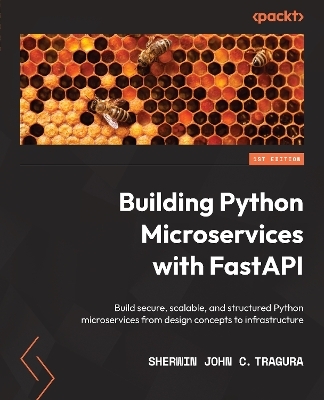
Building Python Microservices with FastAPI
Packt Publishing Limited (Verlag)
978-1-80324-596-6 (ISBN)
Key Features
Provides a reference that contains definitions, illustrations, comparative analysis, and the implementation of real-world apps
Covers concepts, core details, and advanced integration and design-related topics
Imparts context, app templates, suggestions, and insights that are helpful to actual projects
Book DescriptionFastAPI is an Asynchronous Server Gateway Interface (ASGI)-based framework that can help build modern, manageable, and fast microservices. Because of its asynchronous core platform, this ASGI-based framework provides the best option when it comes to performance, reliability, and scalability over the WSGI-based Django and Flask. When working with Python, Flask, and Django microservices, you’ll be able to put your knowledge to work with this practical guide to building seamlessly manageable and fast microservices.
You’ll begin by understanding the background of FastAPI and learning how to install, configure, and use FastAPI to decompose business units. You’ll explore a unique and asynchronous REST API framework that can provide a better option when it comes to building microservices. After that, this book will guide you on how to apply and translate microservices design patterns in building various microservices applications and RESTful APIs using the FastAPI framework.
By the end of this microservices book, you’ll be able to understand, build, deploy, test, and experiment with microservices and their components using the FastAPI framework.What you will learn
Understand, orient, and implement REST APIs using the basic components of the FastAPI framework
Build asynchronous as well as synchronous REST services using the built-in pydantic module and asyncio support
Create small-scale and large-scale microservices applications using features supported by FastAPI
Build event-driven and message-driven applications using the framework
Create an asynchronous and synchronous data layer with both relational and NoSQL databases
Perform numerical and symbolic computations with FastAPI
Who this book is forThis book is for Python web developers, advanced Python developers, and backend developers using Flask or Django who want to learn how to use the FastAPI framework to implement microservices. Readers familiar with the REST API and microservices will also benefit from this book. Some parts of the book contain general concepts, processes, and instructions that intermediate-level developers and Python enthusiasts can relate to as well.
Sherwin John C. Tragura is currently a subject matter expert and technical consultant in a company in the Philippines. He has been part of many development teams customizing Alfresco DMS/RMS and building Java and Python standalone and web projects. He is also a certified professional and bootcamp technical trainer who has delivered technical training on Java, Jakarta EE, C#, .NET, Python, Node frameworks, and other customized training courses since 2011. He was also associated as a lecturer with the Dela Salle University-Manila, Colegio de San Juan de Letran-Calamba, and the University of the Philippines-Los Banos. He is the author of other Packt books, including Spring MVC Blueprints, Spring 5 Cookbook, and Building Python Microservices with FastAPI.
Table of Contents
Setting Up FastAPI for Starters
Exploring the Core Features
Investigating Dependency Injection
Building the Microservice Application
Connecting to a Relational Database
Using a Non-Relational Database
Securing the REST APIs
Creating Coroutines, Events, and Message-Driven Transactions
Utilizing Other Advanced Features
Solving Numerical, Symbolic, and Graphical Problems
Adding Other Microservice Features
| Erscheinungsdatum | 05.09.2022 |
|---|---|
| Verlagsort | Birmingham |
| Sprache | englisch |
| Maße | 191 x 235 mm |
| Themenwelt | Mathematik / Informatik ► Informatik ► Programmiersprachen / -werkzeuge |
| Informatik ► Software Entwicklung ► SOA / Web Services | |
| Mathematik / Informatik ► Informatik ► Web / Internet | |
| ISBN-10 | 1-80324-596-4 / 1803245964 |
| ISBN-13 | 978-1-80324-596-6 / 9781803245966 |
| Zustand | Neuware |
| Haben Sie eine Frage zum Produkt? |
aus dem Bereich



